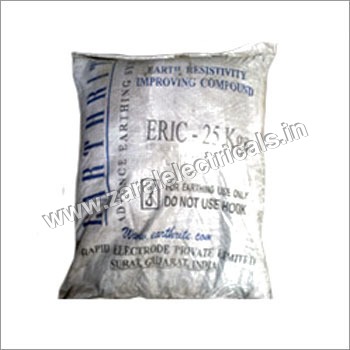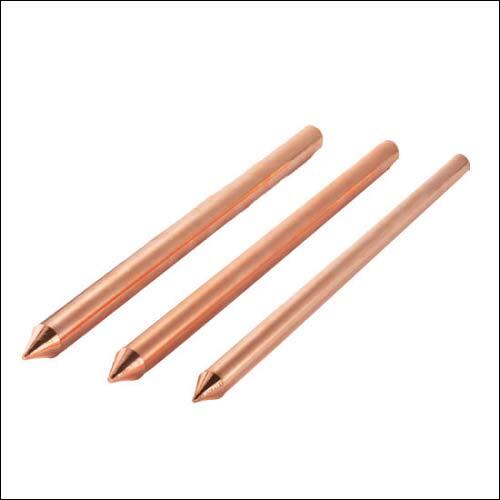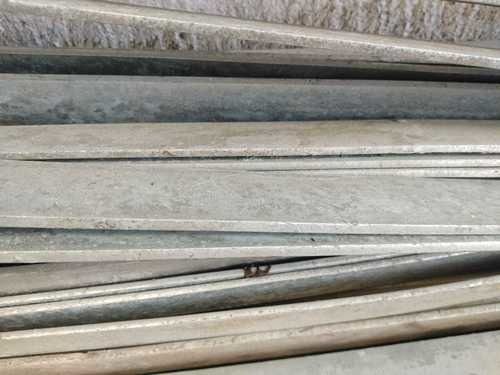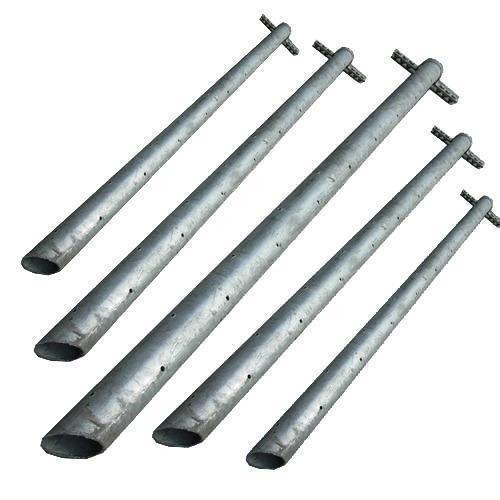Chemical Earthing Electrodes
Price 1900.00 INR/ Piece
MOQ : 10 Pieces
Chemical Earthing Electrodes Specification
- Product Type
- Chemical Electrodes
- Material
- Copper Bonded Steel
- Application
- It is applied at homes, office, solar power plant, etc.
- Function
- To provide low resistance path in ground to any fault and leakage currents as well as to ensure smooth flow of the ground dissipation.
- Shape
- Round
- Surface Treating
- Copper Coating
- Color
- Copper
Chemical Earthing Electrodes Trade Information
- Minimum Order Quantity
- 10 Pieces
- Supply Ability
- 40 Pieces Per Day
- Delivery Time
- 3-4 Days
- Sample Available
- Yes
- Sample Policy
- Free samples are available
- Packaging Details
- Bundle
- Main Domestic Market
- All India
About Chemical Earthing Electrodes
Chemical earthing electrodes are used in grounding systems to dissipate electrical currents safely into the ground. They are an integral part of electrical installations, providing a low-resistance path for fault currents to flow into the earth, thereby preventing damage to electrical equipment and ensuring safety for personnel.
Chemical Earthing Electrode Features:
1. Wear and tear resistance
2. Dimensionally accurate
3. Corrosion resistance
Chemical Earthing Electrode Specifications:
1. Surface: Copper Coating
2. Length of Rod: 2000 mm
3. Electrode Type: Anode, Cathode
4. Material: Galvanized Iron (GI)
5. Brand: Zaral
6. Color: Bronze
Advantages of chemical earthing electrodes:
1. Low resistance: They provide a low-resistance path for fault currents, ensuring effective grounding.
2. Longevity: Properly installed electrodes can maintain low resistance values over an extended period.
3. Versatility: They can be used in various soil conditions and environmental settings.
4. Minimal maintenance: Chemical earthing electrodes typically require minimal maintenance compared to other grounding methods.
Chemical Earthing Electrode FAQ:
Q. How does a chemical earthing electrode work?
Ans: When installed in the ground, the chemical compounds surrounding the electrode react with moisture in the soil, forming a conductive electrolyte. This electrolyte reduces soil resistivity around the electrode, allowing fault currents to dissipate safely into the earth.
Q. How are chemical earthing electrodes installed?
Ans: Chemical earthing electrodes are installed vertically into the ground to a depth determined by soil conditions and installation requirements. The surrounding soil is then backfilled and compacted around the electrode to ensure good contact and conductivity.
Q. Do chemical earthing electrodes require maintenance?
Ans: While chemical earthing electrodes generally require minimal maintenance, periodic testing and inspection are recommended to ensure continued effectiveness. Testing methods such as soil resistivity measurements and ground impedance testing can assess the performance of the grounding system.
Q. Are chemical earthing electrodes suitable for all applications?
Ans: These are suitable for a wide range of applications, including residential, commercial, and industrial settings. However, specific requirements may vary depending on factors such as soil conditions, environmental factors, and the magnitude of fault currents.
Q. Can chemical earthing electrodes be reused if relocated?
Ans: In many cases, these products can be reused if they are carefully removed and reinstalled in a new location. However, proper care must be taken during removal and reinstallment to ensure the integrity of the electrode and the surrounding soil.
Q. What are the typical dimensions and materials used in chemical earthing electrodes?
Ans: Chemical earthing electrodes are typically made of galvanized iron or copper rods with diameters ranging from several millimeters to several centimeters, depending on the application. The surrounding conductive compound mixture may include graphite, bentonite clay, sodium chloride, and other additives.
Robust Copper Coating for Enhanced Longevity
Each electrode features a uniform copper coating that significantly extends the lifespan of the product and enhances electrical conductivity. This protective layer shields the core steel from corrosion, ensuring consistent performance even in challenging soil conditionsmaking them suitable for a wide range of installations across India.
Versatile Applications
Designed for adaptability, our Chemical Earthing Electrodes are widely used in residential buildings, office environments, and renewable energy projects such as solar power plants. Their round shape and standardized dimensions make them easy to install and integrate with various grounding systems, securing critical electrical infrastructure.
FAQs of Chemical Earthing Electrodes:
Q: How does a copper bonded steel Chemical Earthing Electrode function in an electrical system?
A: The electrode provides a low resistance path in the ground, safely dissipating fault and leakage currents, thus protecting electrical installations and ensuring personnel safety.Q: What is the manufacturing process for these earthing electrodes?
A: The process involves bonding a layer of high-purity copper onto a steel core, which is then treated and finished to achieve a robust, conductive, and corrosion-resistant electrode.Q: When should Chemical Earthing Electrodes be installed?
A: They should be installed during the initial phases of electrical system setup or when upgrading grounding for safety enhancements in homes, offices, or solar plants.Q: Where can these electrodes be applied?
A: They are suitable for a range of environments, including residential properties, commercial buildings, and renewable energy installations such as solar power plants.Q: What are the main benefits of using copper coated earthing electrodes?
A: Copper coating ensures superior conductivity and resistance to corrosion, resulting in long-lasting, safe, and reliable earthing solutions for sensitive electrical infrastructures.Q: How do you use and maintain these Chemical Earthing Electrodes?
A: They are installed vertically into the earth at designated grounding points. Minimal maintenance is required, but periodic inspections ensure continued effectiveness and safety.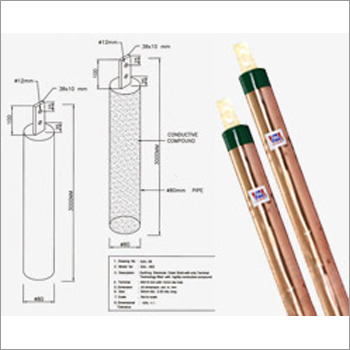
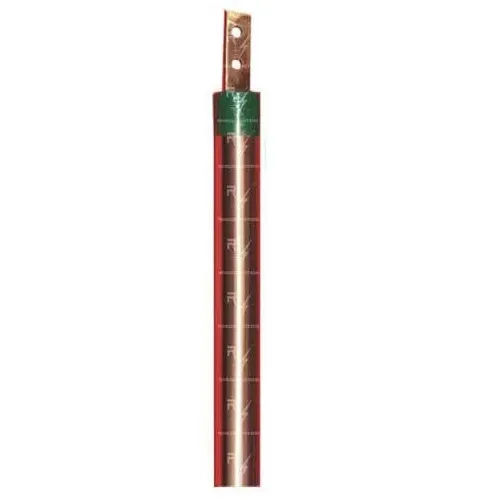
Tell us about your requirement

Price:
Quantity
Select Unit
- 50
- 100
- 200
- 250
- 500
- 1000+
Additional detail
Mobile number
Email
More Products in Earthing Products Category
Chemical Earthing Compound
Price 1900.00 INR / Piece
Minimum Order Quantity : 10 Pieces
Material : Copper Bonded Steel
Product Type : Earthing Compound
Application : It is applied at homes, office, solar power plant, etc.
Copper Earthing Electrode
Price 1300 INR / Piece
Minimum Order Quantity : 1 Piece
Material : Pure Copper
Color : Copper
Product Type : Earthing Electrode
Application : Industrial
GI Earthing Strip
Price 60 INR / Meter
Minimum Order Quantity : 500
Material : other, Galvanized Iron
Color : Sliver
GI Earthing Pipe
Price 320 INR / Meter
Minimum Order Quantity : 500
Material : Galvanized Steel
Color : Sliver


 Send Inquiry
Send Inquiry
